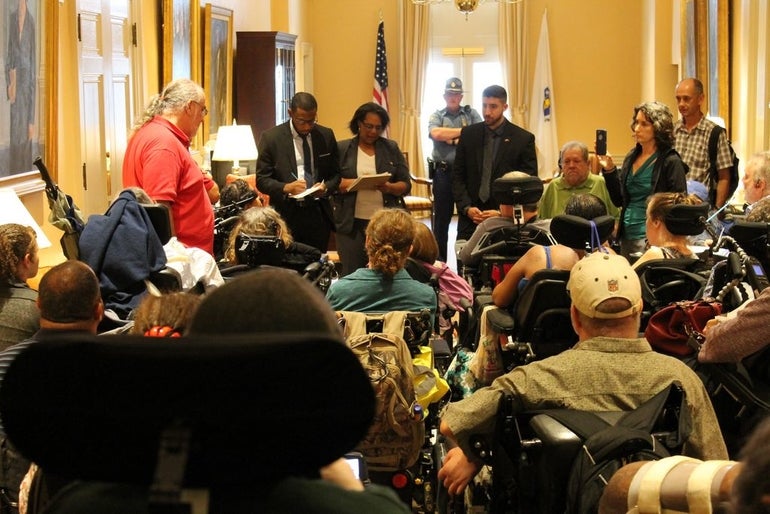With new regulations on overtime for personal care attendants now in effect, advocates gathered outside Gov. Charlie Baker’s office Thursday to protest the changes they said could make it harder for people with disabilities to live independently.
Thursday marked the beginning of an eight-week transition period for MassHealth’s new personal care attendant overtime management policy. According to the Disability Policy Consortium, the policy will cap the number of hours that PCAs can work at 40 hours per week, with some exceptions up to 60 hours a week.
The protesters who demonstrated at the State House, many of whom used motorized wheelchairs, said the restrictions would create a burden for MassHealth members who require more than 60 hours of personal care per week.
“If you need 60 hours a week of care, more than likely your physical health is more compromised, and you need that,” said Joe Tringali, the director of services at Stavros Center for Independent Living. “That’s why you’re getting 60 or more, so if there’s more barriers, then what we’re afraid of is that some of those people will end up in nursing homes.”
Members of Baker’s staff and Robin Callahan, the state’s deputy Medicaid director, met with the protesters inside the lobby of the governor’s office.
“MassHealth is committed to a sustainable, robust PCA program to provide critical service for our members to maintain their community independence and there will be no cuts in the program or change in authorized work hours,” Callahan said in a statement to the News Service. “The FY17 budget will provide an $80M increase for the program, increasing PCA program expenditures by $130M over the past two years. There has been and continues to be ongoing discussions among all of the parties as the overtime management program is implemented over the next several months.”
The transition period will run until Oct. 22, followed by an outreach period that will end on or before Dec. 31. MassHealth members whose PCAs were working overtime can continue to do so with MassHealth approval during the transition period.
Hours of care will not be cut under the new policy, but demonstrators said a cap on hours will require a person who needs over 40 hours of care to find and train additional personal care attendants, which they described as a difficult and time-consuming process.
Dan Greaney, an Amherst resident who was paralyzed in a car accident and also works at Stavros, said notice of the new policy made him “afraid of being re-institutionalized.”
“Over the last year, I hired two people who have both left because the kind of care I need is complex and demanding and the rate of pay is not that good, and the responsibility is tremendous,” Greaney said. “It’s hard to find that person who stays, and I’m on my third person now within a year.”
There are 26,000 MassHealth members who receive PCA services, and 38,700 people employed as PCAs, according to the Executive Office of Health and Human Services.

